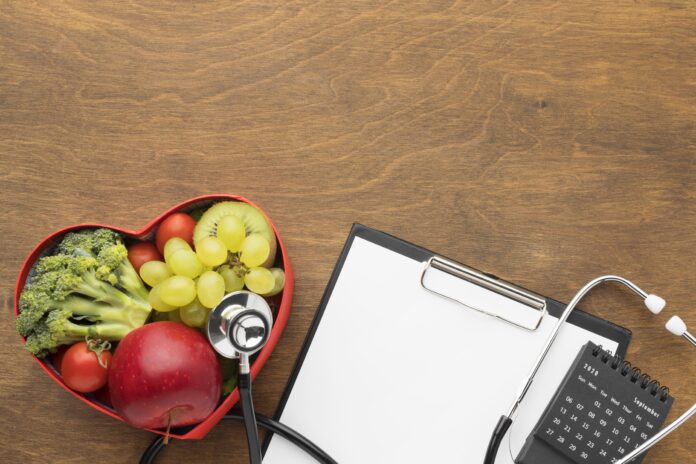Managing portal hypertension, a disorder marked by elevated pressure in the portal venous system, can be difficult. Yet, you can significantly change the symptoms and course of the illness by adopting an organized and well-thought diet, especially by cutting back on sodium.
What is portal hypertension?
Portal hypertension is a condition characterized by high blood pressure in the portal vein, the large vein that carries blood from your intestines, spleen, and stomach to your liver. This increase in pressure can lead to complications like fluid buildup, esophageal varices, and hepatic encephalopathy.
Fortunately, dietary modifications can play a significant role in managing portal hypertension and its symptoms. This blog will explore key dietary tips to help you navigate your condition and promote well-being.
What are the symptoms of portal hypertension?
There are four main symptoms of portal hypertension that help us identify the condition:
- Blood in stool
- Spotting blood in vomit
- Constantly bloated stomach due to water retention
- Visible swelling in the legs and hands
In case you are experiencing any of these symptoms, reach out to the best liver hospital in Coimbatore to seek expert care and treatment.
What is the role of diet in portal hypertension?
The liver plays an impressive role in processing nutrients and filtering toxins from your blood. When portal hypertension occurs, the increased pressure affects this process. Here’s how diet can help:
Reduced sodium intake:
Sodium, found in table salt and other processed foods, can worsen fluid retention, a common symptom of portal hypertension. Limiting sodium intake can help in managing fluid retention and eases pressure on the portal vein.
Improved protein metabolism:
Protein breakdown generates ammonia, a waste product that a healthy liver can easily remove. However, a compromised liver may struggle to eliminate ammonia, leading to hepatic encephalopathy. Dietary adjustments can help manage protein intake and support healthy ammonia levels.
Improved liver function:
Consuming a balanced diet rich in essential nutrients provides your liver with the building blocks it needs to function optimally.
What are the pillars of a portal hypertension diet?
Adopt a low-sodium diet:
This is extremely important in the management of portal hypertension. The ideal sodium intake on a daily basis should be no less than 2,000 milligrams.
Focus on fresh fruits, vegetables, and whole grains which are naturally low in sodium.
Read food labels carefully and choose low-sodium options whenever possible.
Avoid consuming processed foods or packaged foods as they often contain high levels of sodium.
Manage protein intake:
- Protein is essential for building and repairing tissues, but excessive protein intake can overload your liver and lead to ammonia buildup.
- Ensure to take 1-1.5 grams of protein for every kilogram you weigh.
- Prioritize high-quality protein sources like lean meat, chicken, fish, eggs, legumes like beans and legumes, and low fat dairy products.
- Note your protein intake throughout the day, so don’t end up overloading your system.
Make a balanced and nutrient-rich diet:
- Consume plenty of fruits and vegetables for essential nutrients, minerals, and fiber.
- Choose whole grains over refined grains like white bread and rice for sustained energy and healthy digestion.
- Include healthy fats from sources like nuts and seeds. These healthy fats promote overall health.
Maintain hydration:
- Adequate fluid intake is important, but be mindful to avoid overdoing it. At least consume 1.5 to 2 liters of water per day, depending on your activity level.
- You can talk to your doctor regarding the water intake based on your condition.
What are the other considerations you need to consider in a portal hypertension diet?
- Smaller and more frequent meals:
Eating smaller portions more frequently throughout the day can ease digestion and avoid overloading your system.
- Fiber for regularity:
Adequate fiber intake promotes healthy digestion and prevents constipation, which can worsen portal hypertension symptoms.
- Potassium-rich foods:
Certain medications which are recommended for portal hypertension which help in managing the fluid retention can lead to decreasing the potassium levels. It is important to include potassium-rich fruits and vegetables like bananas, leafy green vegetables, and potatoes into your diet. Also make sure to consult your doctor before making any major changes to your diet.
Can lifestyle changes help portal hypertension?
Fortunately, portal hypertension is a condition where healthy habits and lifestyle can help make a significant change in portal hypertension. Following a low-sodium diet along with an active lifestyle can help manage portal hypertension effectively for a long time.
Important Takeaway:Portal hypertension is a life-threatening condition where the liver function is significantly affected. Along with the liver it can also affect other organs in the body compromising its overall functioning. Early detection is extremely important to manage the portal hypertension effectively alongside following lifestyle changes and dietary recommendations. Reach out to the portal hypertension treatment in Coimbatore to get tested for portal hypertension and seek timely treatment.
